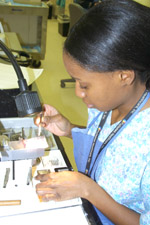To err is human but not in
histotechnology
by
Heather WoolwinePublic Relations
She gets up for the third or fourth time and paces from the kitchen to the living room and back again. Never did she think that one phone call would reduce her to a fidgeting, pacing, worried mess.
Finally, it rings. She lurches forward, answers, and sucks in a breath. Immobile until she hears, “The results were negative,” her breath escapes in a muffled cry of relief. She sets the receiver down and moves on with life.
For patients who wait for either confirmation or rejection of a potential diagnosis, it is a yes or no answer that will either manifest relief or heartbreak.
What most don’t realize is the careful, detailed work that goes into determining that answer.
 Aleah McPherson
carefully separates four pieces of heart tissue from a patient’s biopsy
to ensure accurate results.
Aleah McPherson
carefully separates four pieces of heart tissue from a patient’s biopsy
to ensure accurate results.MUSC’s histotechnologists prepare slices of body tissue for examination under the microscope and are responsible for performing complex procedures for processing tissues. They also must make judgments concerning the quality of results.
These are the people who help determine if your mother has breast cancer or if your son tested positive for leukemia. Needless to say, there is little, if any, room for error.
What most people don’t know about this group of health professionals is the meticulous training required of each histotechnologist, and unfortunately, a shortage of programs and places to train these essential staff members.
“We already have a national shortage of histotechnologists, and it is anticipated that the shortage will worsen as the baby boomers retire. There is legislation pending at the government level, but it remains to be seen whether or not it will avert a crisis within our discipline,” said Vinnie Della Speranza, MUSC Anatomic Pathology manager and president of the National Society for Histotechnology.
To help combat this looming issue, Della Speranza, Donna McClellan, Laboratory Services director, and Nina Epps, Laboratory Services, began a hospital-based histotechnology program. Epps serves as director of the program and Della Speranza is the education coordinator. Aleah McPherson, the program’s first student, graduated in September.
“When I was in college, I had an internship with a histology professor and that sort of began my interest in the field,” McPherson said. “I found out about the MUSC program through a campus advertisement and the timing was perfect. I went into it wanting to soak up as much information as I could and I feel like it really prepared me. The adjustment from student to employee has been challenging at times but everyone here has been great and patient with me.”
While participating in the program, McPherson gained invaluable, on-the-job knowledge in MUSC Laboratory Services as well as learning histotechnol-ogy theory, procedures and best practices.
“Prior to this program, we recruited staff fresh out of college, similar to Aleah, but then we just trained them on-the-job. This made it very difficult for these new hires to pass the board examination required for certification. Ultimately, on-the-job experience alone wasn’t enough to arm them and they had to pursue a great deal of individual study,” Della Speranza said.
McClellan felt that because the view of histotechnology from the vantage point of care remains simplistic, general ignorance across the health care field contributed to the current shortage now facing laboratory services. “Complex, deep scientific knowledge and critical thinking skills are essential to what we do; our methodology involves hardcore science.”
Histotechnologists like McPherson and her colleagues must become experts of hundreds of different tests, identifying tissue structure and cell components, relating the test results to physiological functions, and then implementing new testing techniques and procedures as they are required. A vast understanding of chemistry is essential. “It can be a high-stress profession, because you’re expected not to make any mistakes,” McClellan said. A mistake could mean a false diagnosis, or worse, a missed diagnosis.
McPherson handles the stress of her newfound position by recognizing a need for extreme caution and admitting when she doesn’t have the answer and asking for help. “If I make a mistake, my goal is not to make it twice,” she said.
McClellan, Epps and Della Speranza felt that a program at MUSC would benefit histotechnology students because of the wide array of different procedures and staining techniques here. The MUSC lab rarely sends anything out for analysis, making it an ideal learning environment.
An initial site visit on Oct. 20 went well and those involved with the program are now waiting to hear the final word regarding an accreditation award from the National Accrediting Agency for Clinical Laboratory Sciences (NAACLS).
The program's creators exude excitement when looking toward the future, like the possibility of an online curriculum.
And as for the program’s first graduate? McPherson stated her readiness to take her board examination and despite the small pressure of being the first example of the new program, remained excited about her emerging career in laboratory services.
Friday, Dec. 16, 2005
Catalyst Online is published weekly,
updated
as needed and improved from time to time by the MUSC Office of Public
Relations
for the faculty, employees and students of the Medical University of
South
Carolina. Catalyst Online editor, Kim Draughn, can be reached at
792-4107
or by email, catalyst@musc.edu. Editorial copy can be submitted to
Catalyst
Online and to The Catalyst in print by fax, 792-6723, or by email to
petersnd@musc.edu
or catalyst@musc.edu. To place an ad in The Catalyst hardcopy, call
Community
Press at 849-1778.